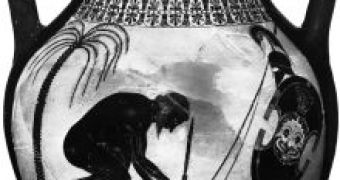Ajax of Salamis was one of the legendary warriors that fought in the Trojan War. Archaeologist Yiannis Lolos has been excavating the remains of what is believed to be Ajax' palace for the past six years.
"This was Ajax' capital,'' he said. "It was the seat of the maritime kingdom of Salamis - small compared to other Mycenaean kingdoms - that was involved in trade, warfare and piracy in the eastern Mediterranean.''
The story of this town is interesting because there is another one in Cyprus that bears the same name. However, the town in Cyprus was founded around 1100 B.C., too late to possibly be Ajax' town. What archeologists have now found is that the people who formed the settlement in Cyprus were probably refugees from the ancient Salamis which was abandoned during the 12th century B.C. because of widespread unrest.
"There is no other explanation for the creation in Cyprus of another city named Salamis,'' Lolos said. "We established that there was a population exodus from Salamis, which was completely abandoned shortly after 1200 B.C. [...] They must first have gone to Enkomi or Cyprus, which was already an established center.'' Later on, people moved further inland to avoid seaborne raids. "It was probably the refugees' children that moved there,'' he added.
The fact that there was indeed an exodus from the Mycenaean Salamis is proved by the fact that no highly valuable artifacts had been found, although it appears to have flourished during the 13th century B.C. in concert with the major centers of southern Greece, Mycenae and Pylos. The place does not show any signs of destruction or enemy occupation, it looks abandoned. "The emigrants, who would have been the city's ruling class, took a lot with them, including nearly all the valuables,'' continued the archaeologist.
The settlement covers around 5 hectares and, besides a palace of around 750 square meters of which the archaeologists have unearthed 33 rooms so far, it includes houses, workshops, storage areas and a cemetery. They have discovered some pottery, stone and copper tools, a seal-stone and, most interestingly, piece of a copper mail shirt stamped with the name of Pharaoh Ramses II, who ruled Egypt from 1279-1213 B.C. Lolos commented on this latter discovery: "This is a unique find, which may have belonged to a Mycenaean mercenary soldier serving with the Egyptians. It could have been a souvenir, a mark of honor or even some kind of a medal.''
Besides being the city ruled by Ajax, Salamis' place in history stems from the fact that it was where the Athenian fleet famously defeated the invading Persian fleet in 480 B.C. This battle is considered one of the most important events in European history as it prevented Greece and Europe from being conquered by the Persian Empire. In 1997, Lolos had made another interesting discovery in the region by uncovering a cave which was identified as the hideout of the ancient poet Euripides, the cave where he had composed his plays.

 14 DAY TRIAL //
14 DAY TRIAL //